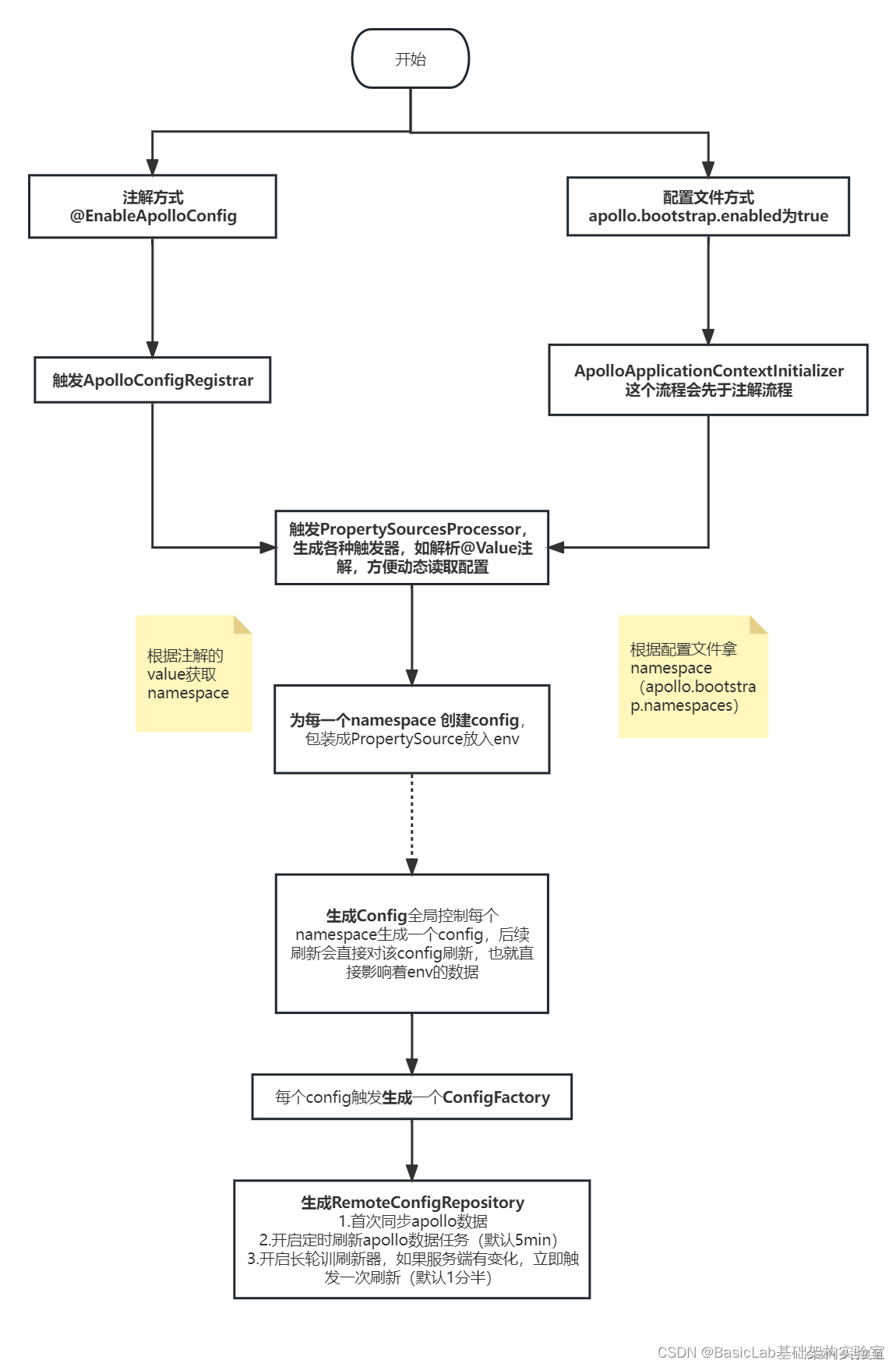网站建设api百度客户管理系统登录
我们经常用到apollo的两个特性:
1.动态更新配置:apollo可以动态更新@Value的值,也可以修改environment的值。
2.实时监听配置:实现apollo的监听器ConfigChangeListener,通过onChange方法来实时监听配置变化。
你知道apollo客户端是如何实现这些功能的吗?使用过程中,需要注意什么呢?
大致流程
在启动spring容器时,即会先后触发ApolloApplicationContextInitializer和ApolloConfigRegistrar为监听的namespace生成对应的config,并封装成propertySource放入env,后续更新就直接操作config,env的数据就被联动更新。
所以我们可以认为有两种方式(注解、配置)使用apollo,两者之间存在一些隐性关系(看到最后你会发现是坑哦)。

方式一:启动配置文件使用apollo——ApolloApplicationContextInitializer
com.ctrip.framework.apollo.spring.boot.ApolloApplicationContextInitializer#initialize(org.springframework.context.ConfigurableApplicationContext)
publicvoidinitialize(ConfigurableApplicationContext context){ConfigurableEnvironment environment = context.getEnvironment();//必须开启apollo.bootstrap.enabledString enabled = environment.getProperty(PropertySourcesConstants.APOLLO_BOOTSTRAP_ENABLED,"false");if(!Boolean.valueOf(enabled)){logger.debug("Apollo bootstrap config is not enabled for context {}, see property: ${{}}", context,PropertySourcesConstants.APOLLO_BOOTSTRAP_ENABLED);return;}logger.debug("Apollo bootstrap config is enabled for context {}", context);//!!!生成config,刷新器,将config塞入environment配置列表最前面(顺序决定优先级)initialize(environment);}protectedvoidinitialize(ConfigurableEnvironment environment){if(environment.getPropertySources().contains(PropertySourcesConstants.APOLLO_BOOTSTRAP_PROPERTY_SOURCE_NAME)){//already initializedreturn;}//从apollo.bootstrap.namespaces获取namespace,默认还是applicationString namespaces = environment.getProperty(PropertySourcesConstants.APOLLO_BOOTSTRAP_NAMESPACES,ConfigConsts.NAMESPACE_APPLICATION);logger.debug("Apollo bootstrap namespaces: {}", namespaces);List<String> namespaceList =NAMESPACE_SPLITTER.splitToList(namespaces);//生成名为ApolloBootstrapPropertySources的CompositePropertySource ,所有namespace共用该propertysource,namespace的顺序也是优先级顺序CompositePropertySource composite =newCompositePropertySource(PropertySourcesConstants.APOLLO_BOOTSTRAP_PROPERTY_SOURCE_NAME);for(String namespace : namespaceList){//生成config(该部分公用,后续分析)Config config =ConfigService.getConfig(namespace);//封装为propertsourcecomposite.addPropertySource(configPropertySourceFactory.getConfigPropertySource(namespace, config));}//最后添加到environment中,这里决定了优先级比注解高environment.getPropertySources().addFirst(composite);}开启配置方式(apollo.bootstrap.enabled为true),则会触发ApolloAutoConfiguration 创建对应的处理器监听器,如动态修改@Value数据
@Configuration@ConditionalOnProperty(PropertySourcesConstants.APOLLO_BOOTSTRAP_ENABLED)@ConditionalOnMissingBean(PropertySourcesProcessor.class)publicclassApolloAutoConfiguration{@BeanpublicConfigPropertySourcesProcessorconfigPropertySourcesProcessor(){returnnewConfigPropertySourcesProcessor();}}publicclassConfigPropertySourcesProcessorextendsPropertySourcesProcessorimplementsBeanDefinitionRegistryPostProcessor{@OverridepublicvoidpostProcessBeanDefinitionRegistry(BeanDefinitionRegistry registry)throwsBeansException{Map<String,Object> propertySourcesPlaceholderPropertyValues =newHashMap<>();// to make sure the default PropertySourcesPlaceholderConfigurer's priority is higher than PropertyPlaceholderConfigurerpropertySourcesPlaceholderPropertyValues.put("order",0);BeanRegistrationUtil.registerBeanDefinitionIfNotExists(registry,PropertySourcesPlaceholderConfigurer.class.getName(),PropertySourcesPlaceholderConfigurer.class, propertySourcesPlaceholderPropertyValues);BeanRegistrationUtil.registerBeanDefinitionIfNotExists(registry,ApolloAnnotationProcessor.class.getName(),ApolloAnnotationProcessor.class);BeanRegistrationUtil.registerBeanDefinitionIfNotExists(registry,SpringValueProcessor.class.getName(),SpringValueProcessor.class);BeanRegistrationUtil.registerBeanDefinitionIfNotExists(registry,ApolloJsonValueProcessor.class.getName(),ApolloJsonValueProcessor.class);processSpringValueDefinition(registry);}/*** For Spring 3.x versions, the BeanDefinitionRegistryPostProcessor would not be* instantiated if it is added in postProcessBeanDefinitionRegistry phase, so we have to manually* call the postProcessBeanDefinitionRegistry method of SpringValueDefinitionProcessor here...*/privatevoidprocessSpringValueDefinition(BeanDefinitionRegistry registry){SpringValueDefinitionProcessor springValueDefinitionProcessor =newSpringValueDefinitionProcessor();springValueDefinitionProcessor.postProcessBeanDefinitionRegistry(registry);}}方式二:使用注解@EnableApolloConfig开启apollo
通过导入ApolloConfigRegistrar,触发PropertySourcesProcessor。
【创建application的beandefinition以后】
publicvoidregisterBeanDefinitions(AnnotationMetadata importingClassMetadata,BeanDefinitionRegistry registry){AnnotationAttributes attributes =AnnotationAttributes.fromMap(importingClassMetadata.getAnnotationAttributes(EnableApolloConfig.class.getName()));//从注解@EnableApolloConfig的value获取namespaceString[] namespaces = attributes.getStringArray("value");int order = attributes.getNumber("order");//在PropertySourcesProcessor添加namespace,order信息PropertySourcesProcessor.addNamespaces(Lists.newArrayList(namespaces), order);Map<String,Object> propertySourcesPlaceholderPropertyValues =newHashMap<>();// to make sure the default PropertySourcesPlaceholderConfigurer's priority is higher than PropertyPlaceholderConfigurerpropertySourcesPlaceholderPropertyValues.put("order",0);BeanRegistrationUtil.registerBeanDefinitionIfNotExists(registry,PropertySourcesPlaceholderConfigurer.class.getName(),PropertySourcesPlaceholderConfigurer.class, propertySourcesPlaceholderPropertyValues);//创建PropertySourcesProcessor为namespace生成config等BeanRegistrationUtil.registerBeanDefinitionIfNotExists(registry,PropertySourcesProcessor.class.getName(),PropertySourcesProcessor.class);BeanRegistrationUtil.registerBeanDefinitionIfNotExists(registry,ApolloAnnotationProcessor.class.getName(),ApolloAnnotationProcessor.class);BeanRegistrationUtil.registerBeanDefinitionIfNotExists(registry,SpringValueProcessor.class.getName(),SpringValueProcessor.class);BeanRegistrationUtil.registerBeanDefinitionIfNotExists(registry,SpringValueDefinitionProcessor.class.getName(),SpringValueDefinitionProcessor.class);BeanRegistrationUtil.registerBeanDefinitionIfNotExists(registry,ApolloJsonValueProcessor.class.getName(),ApolloJsonValueProcessor.class);}PropertySourcesProcessor初始化config(namespace排序),自动更新spring @Value的值
【在创建完所有beandefinition后触发】
publicvoidpostProcessBeanFactory(ConfigurableListableBeanFactory beanFactory)throwsBeansException{//1.初始化config,刷新器,关联environmentinitializePropertySources();//2.初始化AutoUpdateConfigChangeListener,自动更新spring @Value的值initializeAutoUpdatePropertiesFeature(beanFactory);}privatevoidinitializePropertySources(){if(environment.getPropertySources().contains(PropertySourcesConstants.APOLLO_PROPERTY_SOURCE_NAME)){//already initializedreturn;}//生成名为ApolloPropertySources的CompositePropertySource ,所有namespace共用该propertysourceCompositePropertySource composite =newCompositePropertySource(PropertySourcesConstants.APOLLO_PROPERTY_SOURCE_NAME);//排序ImmutableSortedSet<Integer> orders =ImmutableSortedSet.copyOf(NAMESPACE_NAMES.keySet());Iterator<Integer> iterator = orders.iterator();while(iterator.hasNext()){int order = iterator.next();//按照order为每个namespace创建config(公用部分,后续分析)for(String namespace :NAMESPACE_NAMES.get(order)){Config config =ConfigService.getConfig(namespace);composite.addPropertySource(configPropertySourceFactory.getConfigPropertySource(namespace, config));}}// clean upNAMESPACE_NAMES.clear();// 在environment的ApolloBootstrapPropertySources后面或者直接在第一个位置加上前面封装的compsite propertysource,保证注解优先级低于配置方式if(environment.getPropertySources().contains(PropertySourcesConstants.APOLLO_BOOTSTRAP_PROPERTY_SOURCE_NAME)){// ensure ApolloBootstrapPropertySources is still the firstensureBootstrapPropertyPrecedence(environment);environment.getPropertySources().addAfter(PropertySourcesConstants.APOLLO_BOOTSTRAP_PROPERTY_SOURCE_NAME, composite);}else{environment.getPropertySources().addFirst(composite);}}创建Config的系列操作
触发创建RemoteConfigRepository(内部包含首次同步apollo,启动定时刷新器,长轮训刷新器)
创建RemoteConfigRepository
之前说的 ConfigService.getConfig(namespace) ,获取不到config,就会创建一个config,最终创建RemoteConfigRepository。看其构造方法,除了各种属性赋值后,还会调用三个方法,它们很关键哈。
public RemoteConfigRepository(String namespace) {m_namespace = namespace;m_configCache = new AtomicReference<>();m_configUtil = ApolloInjector.getInstance(ConfigUtil.class);m_httpUtil = ApolloInjector.getInstance(HttpUtil.class);m_serviceLocator = ApolloInjector.getInstance(ConfigServiceLocator.class);remoteConfigLongPollService = ApolloInjector.getInstance(RemoteConfigLongPollService.class);m_longPollServiceDto = new AtomicReference<>();m_remoteMessages = new AtomicReference<>();m_loadConfigRateLimiter = RateLimiter.create(m_configUtil.getLoadConfigQPS());m_configNeedForceRefresh = new AtomicBoolean(true);m_loadConfigFailSchedulePolicy = new ExponentialSchedulePolicy(m_configUtil.getOnErrorRetryInterval(),m_configUtil.getOnErrorRetryInterval() * 8);gson = new Gson();// 首次同步apollothis.trySync();// 定时刷新配置(大部分情况返回304,定时刷新在于可以防止长轮询失败)this.schedulePeriodicRefresh();// 长轮询刷新配置(最主要的实时获取配置的途径)this.scheduleLongPollingRefresh();
}首次同步apollo
@Override
protected synchronized void sync() {Transaction transaction = Tracer.newTransaction("Apollo.ConfigService", "syncRemoteConfig");try {ApolloConfig previous = m_configCache.get();// 根据你设定的apollo地址,appId,maxRetries等信息,发送get请求,获取当前apollo配置信息ApolloConfig current = loadApolloConfig();// 更新本地的apollo配置信息if (previous != current) {logger.debug("Remote Config refreshed!");m_configCache.set(current);// 刷新配置的任务可能会调用该方法,获取配置,并且通知客户端的监听器this.fireRepositoryChange(m_namespace, this.getConfig());}if (current != null) {Tracer.logEvent(String.format("Apollo.Client.Configs.%s", current.getNamespaceName()),current.getReleaseKey());}transaction.setStatus(Transaction.SUCCESS);} catch (Throwable ex) {transaction.setStatus(ex);throw ex;} finally {transaction.complete();}
}开启定时刷新配置
private void schedulePeriodicRefresh() {logger.debug("Schedule periodic refresh with interval: {} {}",m_configUtil.getRefreshInterval(), m_configUtil.getRefreshIntervalTimeUnit());m_executorService.scheduleAtFixedRate(new Runnable() {@Overridepublic void run() {Tracer.logEvent("Apollo.ConfigService", String.format("periodicRefresh: %s", m_namespace));logger.debug("refresh config for namespace: {}", m_namespace);// 和上述首次同步的trySync是同一个方法trySync();Tracer.logEvent("Apollo.Client.Version", Apollo.VERSION);}//时间间隔默认是5分钟}, m_configUtil.getRefreshInterval(), m_configUtil.getRefreshInterval(),m_configUtil.getRefreshIntervalTimeUnit());
}开启长轮询刷新配置
public boolean submit(String namespace, RemoteConfigRepository remoteConfigRepository) {boolean added = m_longPollNamespaces.put(namespace, remoteConfigRepository);m_notifications.putIfAbsent(namespace, INIT_NOTIFICATION_ID);if (!m_longPollStarted.get()) {// 开启拉取 startLongPolling();}return added;
}private void doLongPollingRefresh(String appId, String cluster, String dataCenter) {final Random random = new Random();ServiceDTO lastServiceDto = null;while (!m_longPollingStopped.get() && !Thread.currentThread().isInterrupted()) {if (!m_longPollRateLimiter.tryAcquire(5, TimeUnit.SECONDS)) {// 等待5秒try {TimeUnit.SECONDS.sleep(5);} catch (InterruptedException e) {}}// 获取各种信息,发起请求,看apollo中配置有无变更......//200说明 配置发生变化,则主动获取新配置,且调用ConfigChangeListener的实现类的onChange方法 if (response.getStatusCode() == 200 && response.getBody() != null) {updateNotifications(response.getBody());updateRemoteNotifications(response.getBody());transaction.addData("Result", response.getBody().toString());notify(lastServiceDto, response.getBody());}//需要重新长链接//长链接可以监听服务端动态,不需要频繁与服务器建连访问,可以降低资源消耗,也可以得到及时变更通知if (response.getStatusCode() == 304 && random.nextBoolean()) {lastServiceDto = null;}......} finally {transaction.complete();}}
}notify方法会最终进入fireRepositoryChange
sync->fireRepositoryChange
该方法是之前介绍的sync()方法里面提到的,两类刷新配置的任务都会执行此方法,来通知各个监听器,有哪些配置变更。
1.获取新配置
2.统计各种配置的变更
3.通知各个监听器
protected void fireRepositoryChange(String namespace, Properties newProperties) {// 遍历所有的监听器for (RepositoryChangeListener listener : m_listeners) {try {// 把最新的配置信息传递给监听器listener.onRepositoryChange(namespace, newProperties);} catch (Throwable ex) {Tracer.logError(ex);logger.error("Failed to invoke repository change listener {}", listener.getClass(), ex);}}
}@Override
public synchronized void onRepositoryChange(String namespace, Properties newProperties) {if (newProperties.equals(m_configProperties.get())) {return;}ConfigSourceType sourceType = m_configRepository.getSourceType();Properties newConfigProperties = new Properties();newConfigProperties.putAll(newProperties);// 整理且更新配置信息,确定配置的变更类型Map<String, ConfigChange> actualChanges = updateAndCalcConfigChanges(newConfigProperties, sourceType);//check double checked resultif (actualChanges.isEmpty()) {return;}// 调用各个ConfigChangeListener实现类的onChange方法,发送配置信息this.fireConfigChange(new ConfigChangeEvent(m_namespace, actualChanges));Tracer.logEvent("Apollo.Client.ConfigChanges", m_namespace);
}private Map<String, ConfigChange> updateAndCalcConfigChanges(Properties newConfigProperties,ConfigSourceType sourceType) {// 初次统计变化的配置 List<ConfigChange> configChanges =calcPropertyChanges(m_namespace, m_configProperties.get(), newConfigProperties);ImmutableMap.Builder<String, ConfigChange> actualChanges =new ImmutableMap.Builder<>();/** === Double check since DefaultConfig has multiple config sources ==== **///1. 为配置设置旧值for (ConfigChange change : configChanges) {change.setOldValue(this.getProperty(change.getPropertyName(), change.getOldValue()));}//2. 更新 m_configProperties,该处本地env配置被更新updateConfig(newConfigProperties, sourceType);clearConfigCache();//3. 遍历所有的新配置,最后确认各个配置的type(ADDED/MODIFIED/DELETED)for (ConfigChange change : configChanges) {change.setNewValue(this.getProperty(change.getPropertyName(), change.getNewValue()));switch (change.getChangeType()) {case ADDED:if (Objects.equals(change.getOldValue(), change.getNewValue())) {break;}if (change.getOldValue() != null) {change.setChangeType(PropertyChangeType.MODIFIED);}actualChanges.put(change.getPropertyName(), change);break;case MODIFIED:if (!Objects.equals(change.getOldValue(), change.getNewValue())) {actualChanges.put(change.getPropertyName(), change);}break;case DELETED:if (Objects.equals(change.getOldValue(), change.getNewValue())) {break;}if (change.getNewValue() != null) {change.setChangeType(PropertyChangeType.MODIFIED);}actualChanges.put(change.getPropertyName(), change);break;default://do nothingbreak;}}return actualChanges.build();
}总结两种方式的异同
相同之处:
1.创建config的流程和最终关联environment的方式。
2.默认情况下,都是使用application namespace。
不同之处:
1.注解模式优先级低于配置方式。
2. 注解可以在多个地方使用,可以批量设置注解的namespace的优先级;配置文件只能按照配置的顺序来决定优先级。
可能存在的坑
1.如果配置方式和注解方式同时使用,则优先从配置方式里面的namespace读取配置,没有则会从注解的namespace读取配置,不要误以为只会用配置文件指定的namespace!!!
2.如果只是监听application 这个namespace,可以使用ConfigService.getAppConfig(),如果是监听其他XXX namespace,一定要用ConfigService.getAppConfig(“XXX”),不然,就会因为你是用的api触发监听application!!!也就是,即便你只用了配置方式,明确了使用XXXnamespace,还是会以application作为兜底!!!
